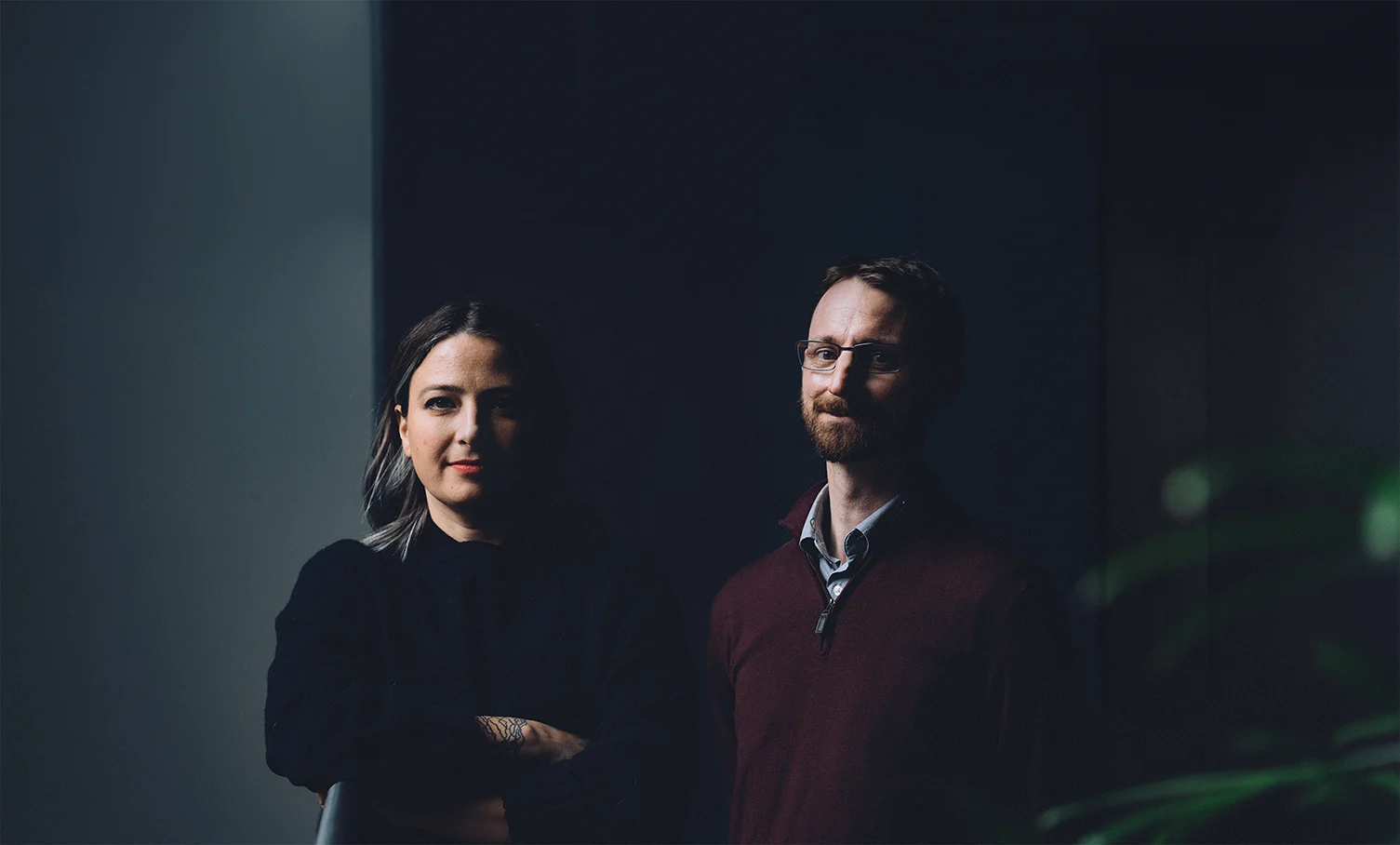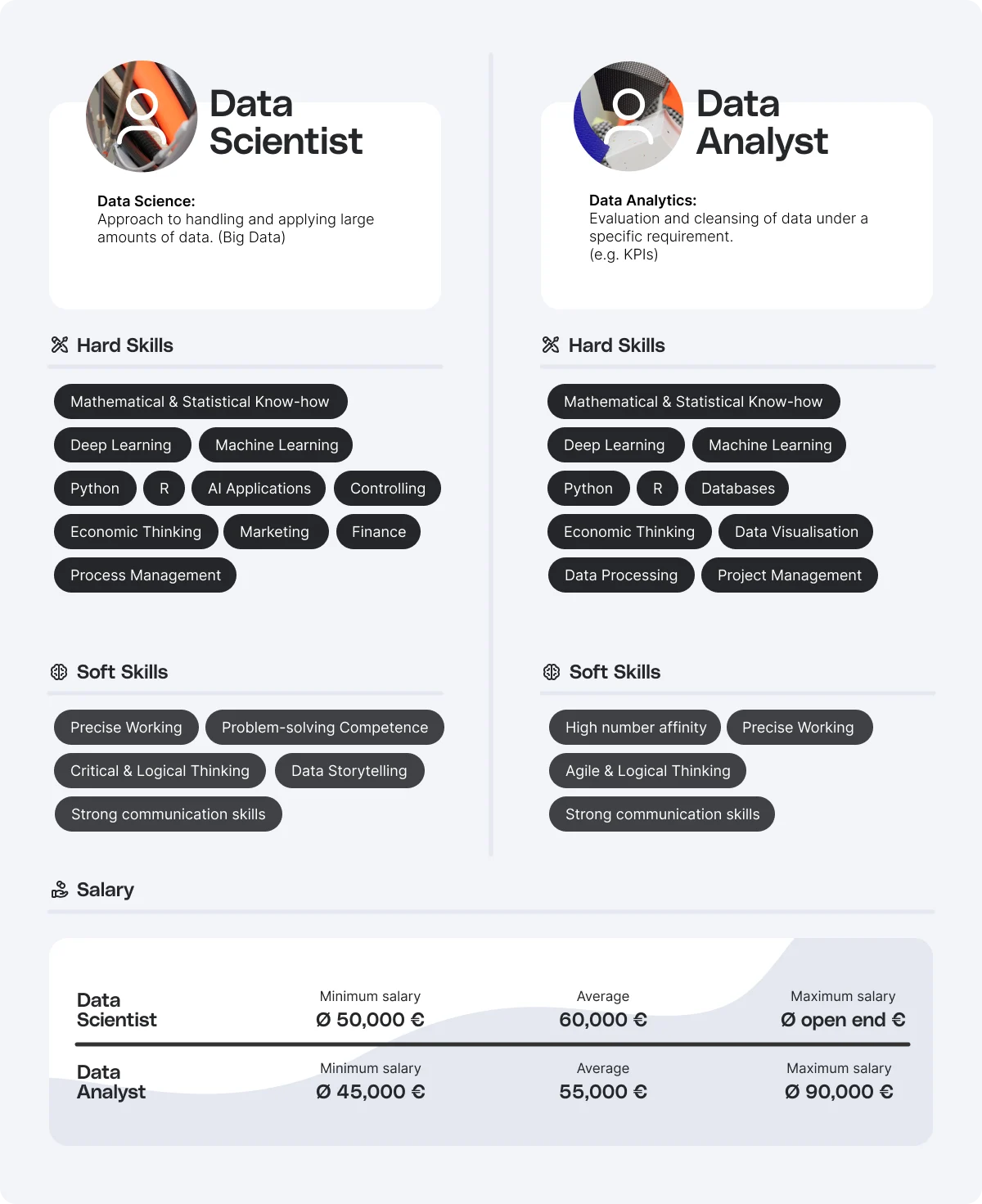Career
Data WHAT? Your possible career in the field of data.
5th October 2023

Data Officer. Data Engineer. Data Analyst. Data Protection Officer. Master Data Miner. Big Data Engineer. Data Scientist. Data Manager. Data Architect. HELP! Who is supposed to keep track of it all. And these are just the tech professions in the field of working with data. But - by the way - these are not just any professions, but rather the major future fields in the IT sector. First and foremost are the two professions of data scientist and data analyst. So it's worth taking a look.
Our data professionals Tereza, Head of Data Science, and Andrew, Head of Data Analytics, therefore briefly and crisply introduce both fields.
Small spoiler: There are really big differences that you should know. Then you'll know which job and career is right for you.

Tereza, how would you describe the job of data scientists?
Tereza: The job of data scientists is primarily to ask the right questions, which can then be answered with the help of data. This also involves developing predictive models, looking for patterns and trends in data sets, or creating algorithms.
In bootcamp, career changers are often very focused on the technical elements of the job. And yes - the bootcamp teaches all the important fundamentals of IT as well as machine learning methods. We teach participants a wide range of algorithms that they can later expand upon in their professional lives. BUT Data Science is more. Because I think Data Scientists* today need to be able to critically question themselves: "Should I even be doing Data Science?"
That sounds like a lot of responsibility!
Tereza: Absolutely. That's why in the bootcamps we often discuss the proposed Data Science products together. In the process, we also talk about any negative effects that might arise. After all, there are risks involved in using data science or machine learning in production! They could have a positive impact on one aspect, but a negative impact on another. Every innovation can influence the world positively and negatively. Data Scientists in their career therefore have a great responsibility!
Andrew, how do the tasks of data analysts differ?
Andrew: Compared to Data Scientists, Data Analysts are more concerned with operational questions about how data can help stakeholders make business decisions on a day-to-day basis. They then gather the information needed to answer these questions. An important part of this is preparing the data visually so that it is understandable.
How do the two professions work together on a day-to-day basis?
Andrew: Very closely. Because data stewards interact with each other on a daily basis and rely on people in other roles to provide the data and tools they need to do their jobs.
Tereza, what startup requirements are helpful in the Data Science field?
Tereza: I think some quantitative background is helpful. A mathematical affinity and the ability to understand complex number relations also makes it easier to get started. But a lateral entry into the job is absolutely possible. What's important is the motivation and willingness to do technical work, to focus and to solve challenges.
Andrew, what skills should career changers bring to the Data Analytics Bootcamp?
Andrew: In addition to the classic hard skills, soft skills such as communication skills, patience, meticulousness, curiosity, perseverance and logical thinking are particularly important for a career in data analytics. The job as a data analyst* is also well suited for lateral entry. Maybe even better in the first step.
How many women are currently working in these fields?
Andrew: There are already some women in the data sector - even if the men are still in the majority. However, I am convinced that the proportion of women will increase significantly in the future. The reasons: The job is very well suited for women. Key words: high flexibility and high shortage of skilled workers. In addition, data jobs are jobs of the future! For women, it is worthwhile to train the necessary skills ... such as in the Data Bootcamps and our special Data Part-Time course.
Which job has the most development potential?
Andrew: Jobs that combine technical skills with people skills are the future. Technology will always be changing and becoming easier to use with advances in automation. At the same time, the challenge of successfully adding value to a business is increasing. And ultimately, this can only be done by people who act in an interdisciplinary manner and have strong social skills.
Tereza: AI will also change the profession of data scientists. This applies to writing code, for example. What AI cannot do, however, is reflective thinking about the product. This is the point where Data Science will remain a profession and secure career in the future. You have to be able to combine different pieces of information, evaluate them critically and decide how and what to develop. So Data Science is not only an extremely important job, but also one that will become more and more relevant.
What excites you about data science or data analytics, respectively?
Andrew: The ability to help business people make better decisions and achieve business goals more effectively.
Tereza: What excites me is that this profession has extreme breadth. It's not just about number crunching - the whole technical side - but also the value of innovation itself and the impact.
Little goodie at the end:
💥Our Data Bootcamps are also available as a Data Part-Time course. 💻
Because we want the course to flexibly adapt to your lives - not you having to adapt to the course. Perfect for all Back to Work'ers and Family CEOs!



What are you waiting for?
Apply today! Our Student Admissions team is happy to speak with you and answer any unanswered questions.